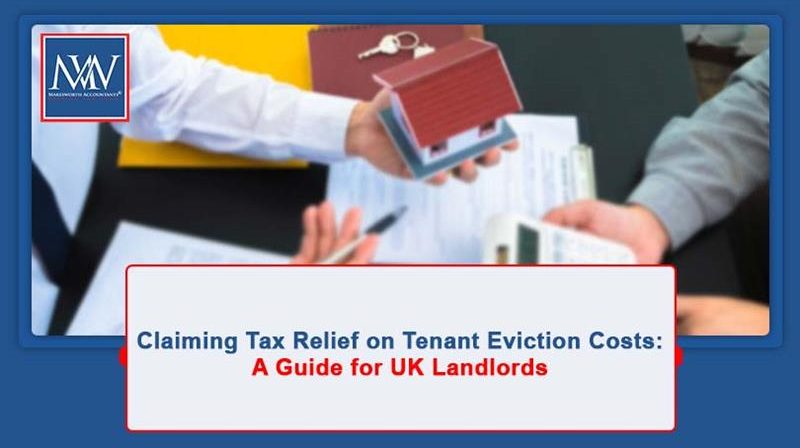
Claiming Tax Relief on Tenant Eviction Costs: A Guide for UK Landlords
Understanding Tax Relief on Tenant Eviction Costs
Evicting tenants is rarely straightforward. For landlords, it can be stressful and expensive — especially when tenants refuse to leave even after receiving a valid Section 21 or Section 8 notice. While the goal is to regain possession lawfully, it’s also important to understand how these eviction costs are treated for tax purposes.
When Eviction Becomes Necessary
When tenants ignore a valid notice to vacate, landlords are left with no choice but to begin formal eviction proceedings. These steps must be followed correctly to avoid accusations of harassment or unlawful eviction. Unfortunately, this process often involves upfront costs that landlords must pay before potentially recovering them from the tenants later.
Court Applications and Related Costs
To begin, landlords must apply for a possession order through the court.
-
Accelerated possession order – If the landlord isn’t seeking unpaid rent, they can choose this route. The application fee is £404, and it’s typically faster since it doesn’t require a court hearing.
-
Standard possession order – If unpaid rent is also being claimed, landlords must use this process instead. It also costs £404 and can be filed online.
After submitting the claim, tenants are given two weeks to respond. If they fail to do so, the landlord may request the court to issue the possession order.
If tenants still refuse to vacate, landlords must take the next step — applying for a warrant for possession, which costs £148, plus any associated legal fees. Once issued, the landlord will receive notice EX96, confirming the eviction date.
To speed things up, the warrant can be transferred to the High Court for a writ of possession, costing £123. This allows a High Court enforcement officer to carry out the eviction more swiftly.
All receipts and records of expenses should be kept safely for tax purposes.
How Tax Relief Applies to Eviction Expenses
The key question is whether the eviction expenses are capital or revenue in nature. This determines how — and when — a landlord can claim tax relief.
1. Revenue Expenditure – When Re-letting the Property
If the eviction is necessary because the tenant breached the agreement (for example, due to unpaid rent or damage), and the landlord plans to re-let the property, the related costs are classed as revenue expenses.
👉 These can be deducted from the rental income when calculating taxable profit — as long as they are not reimbursed by the tenant.
2. Capital Expenditure – When Selling the Property
If the landlord serves a Section 21 notice with the intention of selling the property, the costs of eviction are treated as capital expenses.
👉 In this case, the costs are deductible from the sale proceeds when working out any capital gain or loss.
Insurance Recoveries and Unpaid Rent
If an insurance policy covers some of these expenses, the insurance payout must be taken into account. Similarly, if any unpaid rent is recovered — either directly from the tenant or via insurance — that amount must also be included when calculating taxable rental profits.
Final Thoughts
Evicting tenants can be an emotional and financial strain, but careful record-keeping and understanding the tax rules can make a significant difference. Whether the costs count as revenue or capital depends on your reason for eviction — so always document your purpose and expenses clearly.
Taking the time to classify your costs correctly ensures you don’t miss out on valuable tax relief and remain compliant with HMRC rules.
For more information, Book a Free Consultation
Need Accountancy Support?
For information on bespoke training, or if you have any other questions for Makesworth Accountant, please fill in your details below
















 151
151